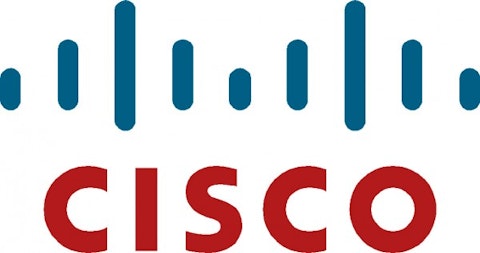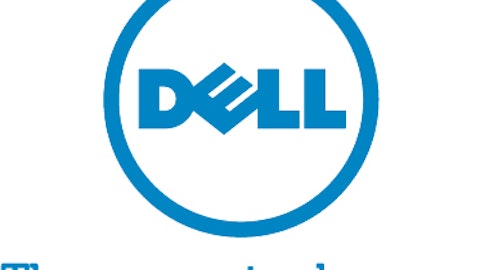Cisco Systems, Inc. (NASDAQ:CSCO) was one of the tech darlings of the 1990’s. The stock rose 69,230% from its public offering in February of 1990 through 12/31/1999. That equates to a 94% annual return compared to 25.6% for the NASDAQ over the same period. Then, as though on cue, at the dawn of the 21st century, the stock stalled out, tail-spun into a rapid descent and finally, flat-lined with little hope (or expectation) of robust future earnings growth or stock price outperformance.
From 12/31/1999 through 12/31/ 2011 the stock generated a total return (which includes price movement and dividend income) of -61.9% or a loss of just over 7% per year. Compare this to the return of NASDAQ for the same period–a decline of 16.9% or -1.4% per year (again including price and dividends). When it comes to Cisco Systems, Inc. (NASDAQ:CSCO) and all fallen-angel growth stocks for that matter, investor emotions have run the gamut from love to disappointment to hate and finally, neglect. So why buy the stock now?
The company surprised investors in May of this year when management reported better than expected fiscal year third quarter earnings. The stock rallied dramatically on the news and is up approximately 24% year-to-date through May 31–the bulk of that return coming after the earnings report. Cisco Systems, Inc. (NASDAQ:CSCO) CEO, John Chambers, normally strikes a conservative tone. On the May 15 earnings conference call he was surprisingly upbeat about the company’s prospects, “Cisco Systems, Inc. (NASDAQ:CSCO) is executing at a very high level in a slow, but steady economic environment…We are starting to see some good signs in the US and other parts of the world which are encouraging.”
In subsequent interviews Chambers stated that although the pace of technological change is increasing, Cisco Systems, Inc. (NASDAQ:CSCO) has historically taken advantage of change to transform the business and trounce the competition. “Usually, when things are toughest for us is when we work harder and surprise people. That’s when they should be betting on us.” That kind of optimism bodes well for future growth.
Cisco Systems, Inc. (NASDAQ:CSCO) management and the board of directors initiated a dividend in 2011 and the quarterly dividend has gone up three-fold since then resulting in an expected yield of 2.8%. (The S&P 500 currently yields 1.3%.) When rocket-propelled growth stocks mature, the declaration of a dividend is often perceived by investors as a declaration of surrender to future growth opportunities for the company. But, in fact, often at this point in the company’s growth, the dividend signals what management and the board think about future earnings growth. In other words, the dividend is frequently established as a portion of what management and the board believe is sustainable, long-term earnings power. John Chambers joined a dignified group of corporate managers when he said as much about a dividend increase in August of 2012: “We wanted to send a message to shareholders.”
Slowing growth does not have to be a death knell for future stock price performance. Nor does the initiation of a dividend. The market is full of many companies who have successfully made the transition from growth to value stock and have gone on to generate solid performance. International Business Machines Corp. (NYSE:IBM), like Cisco, managed the growth maturation process and also dealt with the additional burden of shifting technological trends.
After maturing from Nifty-Fifty growth stock darling to mature, old-fashioned computer company, IBM spent a decade in exile just as Cisco did. But the company transformed its underlying business from mainframe-dependent to personal computer-driven in the early 1980’s and eventually earnings growth as well as the stock price re-accelerated. Then PC’s took a back-seat to laptops and International Business Machines Corp. (NYSE:IBM) again made the adjustment. By the time the iPhone and iPad challenged traditional lap-top computing, IBM had already transformed itself into a cloud-centric, services driven technology company. Since Jan. 30, 1968 (the earliest data I could find) through May 31, 2013–including all the company’s fits and starts–International Business Machines Corp. (NYSE:IBM) has provided a total return of 3,483.08% (including reinvestment of the dividend) or 8.2% per year. Buying great companies for the long-term may not result in year-to-year outperformance but over the long-term, it frequently pays off.
Cisco is in the midst of the kind of technology-driven transformation IBM managed well over the last forty-plus years. Though still predominantly a networking equipment company, Cisco is expanding its portfolio of software and services that produce stable, recurring revenues. Their particular emphasis for growth is focused on data centers which represented only 4% of sales last quarter but grew 77%. Juniper Networks, Inc. (NYSE:JNPR), remains an important competitor to watch. The investment in new products, which drove up Juniper Networks, Inc. (NYSE:JNPR)‘s operating expenses over the last two years, now has the company poised to grow earnings over 20% and gain share in routers and switches and new products–presumably at Cisco’s expense.
The smaller, nimbler Juniper has outpaced Cisco in the past and undoubtedly will again, but for a core, long-term holding Cisco’s lower volatility is appealing. With $30 billion in cash, a price/earnings ratio of 11.5 times next year’s earnings, a dividend yield double that of the S&P 500 and a management team executing extremely well in a difficult global economic environment, Cisco is the kind of long-term investment idea investors should consider as a core holding.
Nancy Tengler owns shares of International Business Machines., Coca-Cola, and Cisco Systems. The Motley Fool recommends Cisco Systems and Coca-Cola. The Motley Fool owns shares of International Business Machines. and Qualcomm. Nancy is a member of The Motley Fool Blog Network — entries represent the personal opinion of the blogger and are not formally edited.
The article Why Cisco Makes Sense for the Long-Term originally appeared on Fool.com is written by Nancy Tengler.
Copyright © 1995 – 2013 The Motley Fool, LLC. All rights reserved. The Motley Fool has a disclosure policy.






